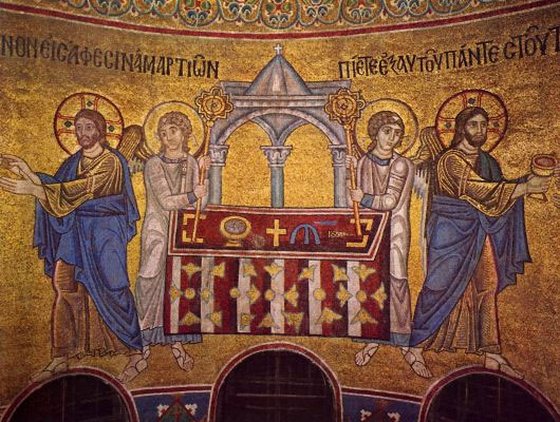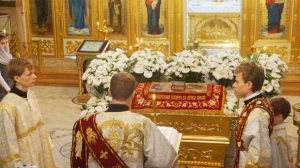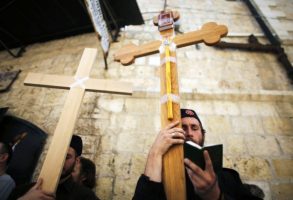Before the very beginning of His sufferings, the Lord gathered His disciples at the Mystical Supper. Although our Lord had the right to say, “I have said nothing in secret” (as He said to His enemies); and although the mindset of secrecy and conspiracy is foreign to Christianity – especially empty games in sham mysteries, in mysteriousness, in secrets (which is characteristic of occultism) – there is a mystery at the heart of Christianity.
Christ’s Supper was mystical [i.e., secret]. First of all, because the disciples gathered around the Teacher – hated by the world, hated by the prince of this world, which lies in the ring of evil and mortal danger – which demonstrates Christ’s magnanimity and requires fidelity of His disciples. This requirement, which Judas broke by his awful betrayal, and which the other disciples fulfilled only imperfectly when they fell into a slumber from despondency when they should have been keeping watch with Him during His agony in the garden. Peter, flustered by fear, denied his Teacher with an oath. All the disciples scattered.
But there is line between fidelity, however imperfect, and complete betrayal. This is a terrible line: there is an irreconcilable conflict between His magnanimity and holiness, between the Kingdom of God that He proclaims and brings to people, and the kingdom of the prince of this world. It is so irreconcilable that, when we draw near to the mystery of Christ, we find ourselves before the last choice. After all, we draw so near to Christ that believers of other religions cannot even imagine it. They cannot imagine that one can draw so close to God as when we taste Christ’s flesh and drink His blood. This is difficult to conceive, much less to express! How hard must it have been for the Apostles the first time they heard the words by which the Lord instituted the truth of the Eucharist! And woe to us, if we do not feel at least a little of the trembling that must have filled the Apostles then!
The Mystical Supper is also mystical [i.e., secret] because it should be sheltered from the hostile world and because in essence it is the impenetrable mystery of the ultimate condescension of the God-Man toward people: the King of kings and Lord of lords washes the feet of the disciples with His own hands, thereby revealing His humility to us all. What could exceed this? Only one thing: to give Himself over to death. And the Lord does this.
We are weak people. When our hearts become deadened, we want prosperity. But as long as we have a living heart — sinful, but living – what then does the heart long for? That there would be an object of love, infinitely worthy of love; that it would find such an object of love and serve it, without sparing itself.
All people’s dreams are irrational, for they are dreams. But they are alive so long as the living heart strives not for prosperity, but for sacrificial love; that we may be gladdened by the Lord’s unspeakable magnanimity toward us, that we may respond to it with some small part of magnanimity, and truly serve the King of kings and Lord of lords, Who is so magnanimous to His servants.

Eucharist. St Sophia Cathedral in Kiev
In the person of His Apostles, the Lord called us His friends. This is more awesome to think of than to conceive of ourselves as God’s servants. A servant can hide his eyes in bowing; but a friend cannot turn away from the gaze of his friend – reproachful, forgiving, seeing the heart. The mystery of Christianity, in contrast to the sham mysteries that deceive people with false teachings, is like the depth of crystal-clear water that is so great we cannot see the bottom. In fact, there is no bottom.
What can we say at this meal? Only one thing: that the Holy Gifts, which have been offered and given to us, are the very Body and Blood of Christ, of which the Apostles partook with unimaginable trembling. This is also our gathering: this is the same, ongoing Mystical Supper. Let us pray that we do not give out this mystery of God, this Mystery that joins us to Christ; that we might experience the warmth of this mystery; that we might not betray it; and that we might respond to it even with the most imperfect fidelity.
Blessed Augustine said something about the Eucharist that is difficult for our cowardly hearts. He explained the Eucharist, in part, as a call to martyrdom: for the Body and Blood that Christ gave unto to us, we should be ready to give our own body and blood. Few are called to martyrdom in its full sense, and we shall not speak of matters that are too lofty for us. But if the Lord, having washed our feet, gives us His Body and Blood, how can we not endure magnanimously even those small discomforts that we have to endure?
Let us pray that we never forget the mystery into which we are drawn by the great mystery of the Mystical Supper; that we may never betray it to its enemies, visible and invisible; and that we may never feel a stony insensitivity towards it. Let us pray that our hearts may be keen to serve the King of kings, Who is so merciful towards us, Who is so close – as close as can be, as close as the Food that we taste.
One more thought should occur to anyone who listens to this Gospel reading. We see that during His earthly life our Lord kept the law of the Old Covenant. He came to Jerusalem in connection with the cycle of feasts that was observed by the Jews, between the Jewish Passover and the Jewish Pentecost. He came not to destroy, but to fulfill; and His life began with submission to circumcision according to the Law. Why then did the same Lord so consistently challenge legalism, as in the question of the complete rest that the Jewish scribes demanded of men on the Sabbath?
This, of course, is meant to teach us that goodness is more important than ritual, more important than ritual correctness. This saves us from the danger of ritualism. But it still seems that this is not all. What did the strict observance of the Sabbath signify for the believing Jew? It meant that God’s creative work was completed on the seventh day. On the seventh day, God rested from His labors, and this completion of God’s creation was celebrated every Saturday.
A faithful person’s resting witnessed to his faith that the world would not be changed. (Although at the time of Christ there was a teaching, not altogether clear, about the world to come and the resurrection. The Pharisees believed in this, while the Sadducees rejected it, so that it was not yet a universal belief.) If God’s rest was celebrated as complete inactivity, as an end to His creativity, then this means that world is stable. This is written with mournful beauty in the book of Ecclesiastes: that which has been, the same will be (c.f., Ecclesiastes 1:9).
Our Lord contrasts this with another teaching, without destroying the meaning of the Old Testament, but rather complementing it: God’s rest is not a cessation of His creativity (although God’s world is perfect and complete insofar as it is not spoiled by the deeds of fallen spirits and fallen men). Even now, when we see any creation of God — blossoming branches in spring or any other creation — we hear the words of the Creator: this is very good.
But God’s plan has not yet been realized, namely His plan to transfigure the world. God made us people, but we made ourselves fallen. But God wants to raise us to such dignity that the Apostle John was unable to find words for it in his epistle, when he said: Now we are the sons of God, but we do not know what we will be [cf. 1 John 3:2]. And the Lord said: My Father continues to work, continues to create, and I continue to work [cf. John 5:17]. A sign of this is healing on the Sabbath.
The mercy of God is limitless and generous, anticipating man and his requests and prayers, to say nothing of his correction. But the mercy of God is demanding. We know how we behave with other people’s children and with our own. If we are not entirely wicked people, we are happy to show affection to children for whom we have no responsibility, to give them some candy, to rejoice over them, and to demand nothing of them. We are not responsible for them. For both them and us, this is a momentary joy, without continuation or further meaning. But God is not kind to us like some fellow who gives us candy and goes on his way, asking nothing of us. The Lord meets a man whom He healed and reminds him that the great mercy he has received is simultaneously a requirement: do not sin. The more the Lord gives us, the more He requires of us.
It will be yet better if we understood that His requirements of us are the best thing He gives us. The words “sin not” were said to a man who was healed of a very grievous, very long sickness, who was rescued from the bitterest misfortune. But not everyone, even if he lives in prosperity and relative safety, knows what unseen abysses the hand of God may conduct him over. So these words are also directed at us: sin not, lest a worse thing befall you. For even those of us (if there be any such) who have no memory of such things in their past – of miraculous deliverance from great misfortune, or of a misfortune that came and later retreated – have every reason to know that each moment could be much worse. We have led ourselves and God’s world into such a state that misfortunes should befall us. So it is prudent for us not to sin (even apart from the fact that this is a duty of gratitude), for the Lord has not dealt with us according to our sins.
Let us pray that the Lord will raise our weakened souls and hearts, and that He will complete the rebirth of our Fatherland. And today we should also pray for those souls who paid for the victory of our Fatherland with their blood. We should also remember those who gave up their lives in the Russian diaspora for the salvation of those who were threatened by the inhuman Nazi regime. We should remember such people, like Mother Maria. Let us pray that, like the paralytic who had lost all earthly hope, our Fatherland might receive health in spite of our sins. Amen.
Delivered on April 15, 1993
Translated from the Russian.

















